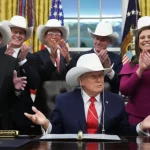
A House Oversight Committee markup hearing for a bipartisan bill aimed at allowing the Washington, D.C., government to redevelop the site of the former RFK Stadium turned into a debate on D.C. home rule.
The focus of the hearing was shifted from the proposed bill, sponsored by committee Chairman James Comer (R-KY) and Del. Eleanor Holmes Norton (D-DC), to potentially turn the land into a new stadium or commercial development, after Rep. Scott Perry (R-PA) proposed an amendment which would have prevented the D.C. government from using any public funds to build a stadium on the land as part of the proposed lease.
OKLAHOMA SUPERINTENDENT SAYS BIDEN WANTS TO TURN STUDENTS INTO ‘SOCIAL JUSTICE WARRIORS’
The D.C. Robert F. Kennedy Memorial Stadium Campus Revitalization Act would transfer control of the land in the district from the Secretary of the Interior to the administrator of the General Services Administration. Under control of the General Services Administration, the bill stipulates the administrator must enter a lease with the government of D.C. to allow it to redevelop the land into whatever it wants, including a new stadium, commercial or residential developments, or recreational facilities.
Perry said he believes that the taxpayer should not be on the hook for a potential new stadium, as a condition of giving the land to D.C.
“Ultimately one, but not both of these, of the following is true about these projects. Either, they will result in a profit for their developers, thus rendering subsidies unnecessary, or they are unprofitable and our constituents should not be left holding the bag. Local and state governments should not be shaken down by corporate interests and the all-too-common crony grifting scheme,” Perry said.
Norton argued against the amendment to the bill, saying it would infringe on D.C.’s home rule and that the decision on whether public funds are used for a stadium project should be up to the D.C. government.
“How D.C. spends its local funds, which consists of local taxes and fees, should be a decision for D.C. — not Congress. D.C.’s local elected officials should be able to decide for themselves how they spend local D.C. funds,” Norton said. “If they want to spend local D.C. funds on a stadium, they should have the authority to do so. If they do not want to spend local funds on a stadium, they should have the authority not to.”

A team spokesperson said Thursday, May 4, 2023, officials are communicating with stakeholders at the federal and local levels about the RFK site. (AP Photo/Andrew Harnik, File)
The amendment found some unusual allies and enemies, with ranking member Jamie Raskin (D-MD) agreeing with the amendment, and voting for it, arguing it was not about D.C. home rule but rather about public funding for stadium projects. Rep. Gerry Connolly (D-VA) disagreed with his Democratic colleague, saying it would be proscribing what D.C. could do.
“I don’t like using taxpayer dollars for stadiums. That’s my philosophical position. That’s different, though, than proscribing what the District of Columbia can do,” Connolly said.
Comer came out against Perry’s amendment, arguing that it would “hinder” the D.C. government’s ability to “create economic opportunities” on the land.
“We’ve been critical of some of the decisions the Washington council has made, especially with respect to crime and things like that. I believe that we’ve got to do what we can to work with the city to create jobs. And to take a vacant property and redevelop it, that’s what we want,” Comer said.
“I believe that this amendment would hinder D.C., at a time when we need to do everything we can to work with D.C. to create economic opportunities for the city,” he added.
The amendment failed, 13-24, with Republicans and Democrats voting on both sides and Norton almost accidentally voting for the amendment.
“Let me say, that was the most interesting coalition of yes’s and no’s in the history of the House Oversight Committee. Historians will be studying that roll call vote for decades,” Comer joked after the vote on the amendment.
The bill was reported favorably out of committee in a 31-9 vote of the committee. Based on the vote of the committee, the bill looks likely to pass in a wider vote of the full House.
CLICK HERE TO READ MORE FROM THE WASHINGTON EXAMINER
The advancement of the legislation out of committee looks to set Washington, D.C., as the front-runner to replace the Washington Commanders‘s aging FedEx Field in Landover, Maryland, which opened in 1997.
Washington, D.C., Maryland, and Virginia are all fighting for the Commanders to build a stadium in their jurisdictions. The Commanders currently have their headquarters in Ashburn, Virginia, but the access to the Washington Metro and location on the Anacostia River makes the RFK Stadium site desirable.





